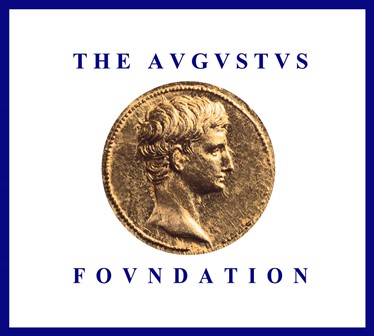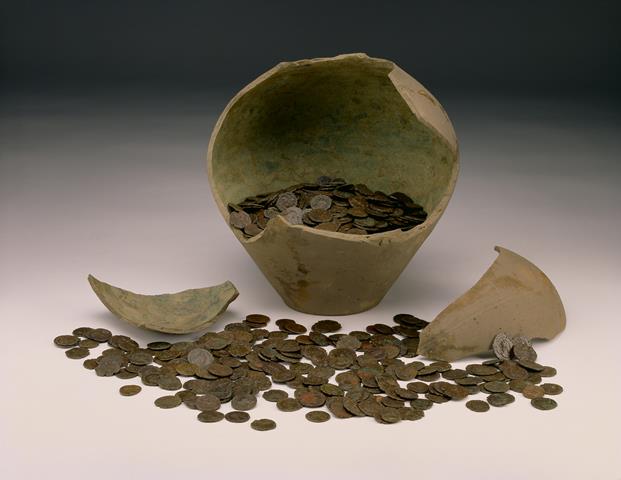Thursday 15 - Friday 16 September 2016
Ioannou Centre for Classical and Byzantine Studies, University of Oxford
Many thousands of coin hoards have been found throughout the geographical area which once constituted the Roman Empire. The information provided by these hoards has the potential to transform our understanding of coin supply, circulation and use, as well as having implications for the study of the Roman economy and the archaeology of religion and ritual. The Coin Hoards of the Roman Empire Project aims to provide a comprehensive summary of this data, thus filling a major lacuna in the digital coverage of hoards from antiquity. This conference will present results from the first three years of the project, as well as exploring new approaches to the study of coin hoards and hoarding and outlining the potential for future research. Papers will form the basis of a monograph on Roman hoarding in the Oxford Studies on the Roman Economy series, published by Oxford University Press.
Programme
Thursday 15 September |
|
9.30–10.00 |
|
Welcome and introductory remarks Chris Howgego, Andrew Wilson and Lorne Thyssen |
|
10.00–10.40 |
|
Coin Hoarding in the Roman world: an Empire-wide perspective Philippa Walton (University of Oxford) |
|
10.40–11.00 |
|
Coffee break |
|
11.00–11.40 |
|
Numerical and statistical approaches to studying Imperial hoards Kris Lockyear (UCL) |
|
11.40–12.20 |
|
Metallurgical perspectives on coin hoards Kevin Butcher (University of Warwick) and Matt Ponting (University of Liverpool) |
|
12.20–13.00 |
|
Spatial analysis of hoard data Andy Bevan (UCL) |
|
13.00–14.00 |
|
Lunch |
|
14.00–14.40 |
|
Hoarding in Roman Britain: an archaeological and contextual approach Eleanor Ghey (The British Museum) |
|
14.40–15.20 |
|
Hoarding in Burgundy, France. A micro-study of a region Antony Hostein (Université Paris 1 - Panthéon-Sorbonne) and Pierre Nouvel (Université Franche-Comté-Besançon) |
|
15.20–15.40 |
|
Coffee |
|
15.40–16.20 |
|
The interface between East and West (local versus imperial) as seen in hoards from Greece and Macedonia Sophia Kremydi and Athena Iakovidou (National Hellenic Research Foundation) |
|
16.20-17.00 |
|
'The Far Side’. Coin hoards from the Barbaricum Alec Bursche (University of Warsaw) and David Wigg-Wolf (Römisch-Germanische Kommission) |
|
|
Friday 16 September |
|
09.30–10.10 |
|
Dating civic hoards of the third century – a response to Gothic raids or monetary reform? Ivan Bonchev (University of Oxford) |
|
10.10–10.50 |
|
Coin hoards on the Mediterranean coast in the first to third centuries AD: regionality and circulation patterns A. Tolga Tek (Anadolu University, Ankara) |
|
10.50–11.30 |
|
Coinage reform as seen through Roman hoards in Egypt Thomas Faucher (CNRS) |
|
11.30–11.50 |
|
Coffee break |
|
11.50–12.30 |
|
Republican coins in Imperial hoards Bernhard Woytek (Austrian Academy of Sciences, Vienna) |
|
12.30–13.10 |
|
Date of issue versus date of deposition. The implications of using hoards to date site finds Ben Hellings (Yale University Art Gallery) |
|
13.10–13.40 |
|
Political borders and coin circulation: the case of the Gallic Empire Jerome Mairat (University of Oxford) |
|
13.40–14.40 |
|
Lunch and poster presentation session |
|
14.40–15.20 |
|
The end of Roman hoarding in the North Western provinces Johan van Heesch (Coin Cabinet, Royal Library of Belgium) |
|
15.20–16.00 |
|
Hoards of silver plate as currency Richard Hobbs (The British Museum) |
|
16.00–16.20 |
|
Coffee break |
|
16.20-17.00 |
|
Hoards, weights, wear and circulation John Creighton (University of Reading) |
|
17.00-17.30 |
|
Concluding remarks Andrew Wilson and Chris Howgego (University of Oxford) |



